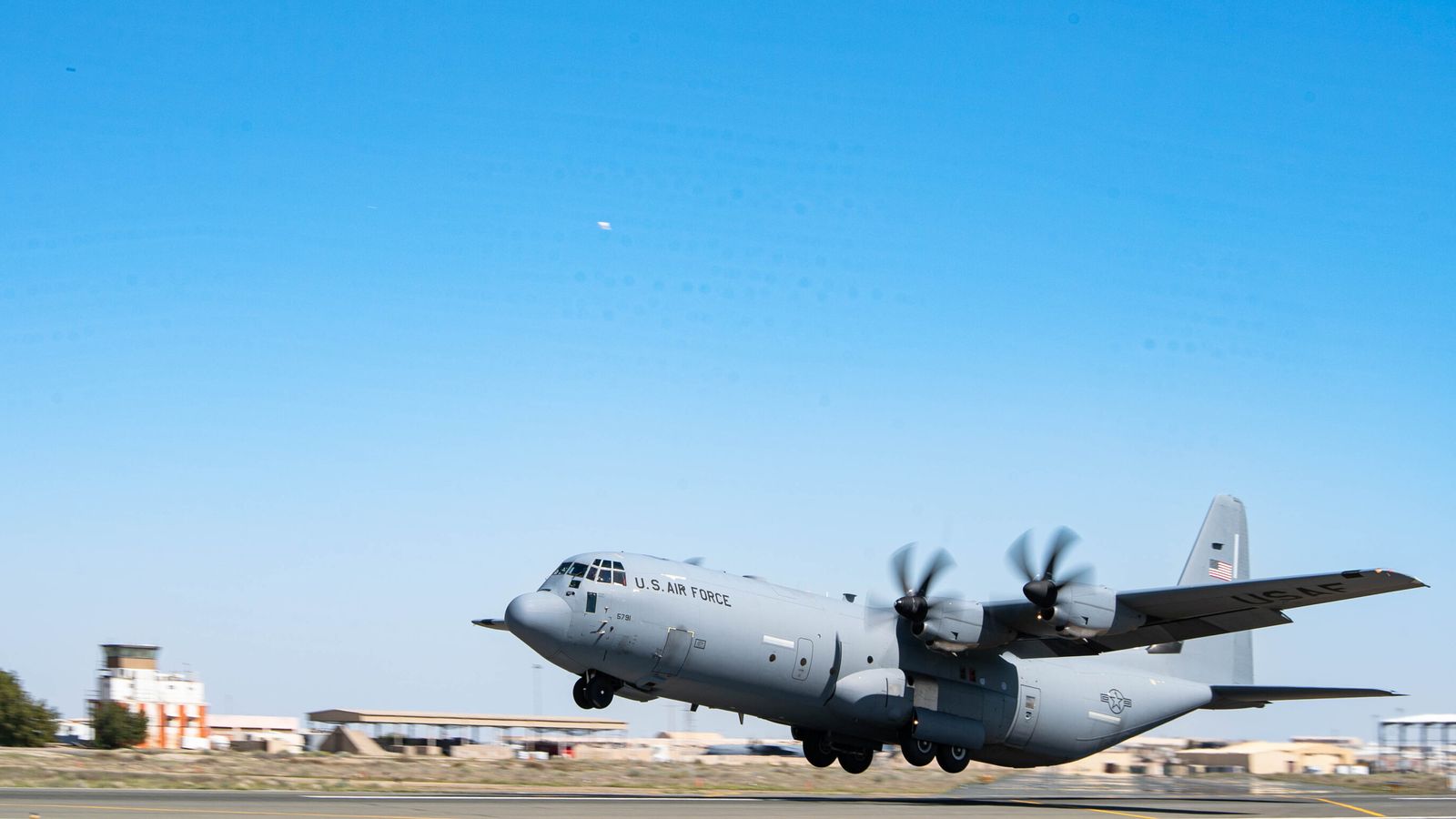The US military has carried out its first airdrop of aid into Gaza, where a quarter of the population is facing starvation.
The joint effort with the Royal Jordanian Air Force, using C-130 Hercules transport planes, saw the US dropping 66 bundles containing more than 38,000 meals along Gaza’s Mediterranean coastline.
A US military official said planning was also under way for “potential follow-on airborne aid delivery missions”.
The war between Israel and Hamas began on 7 October last year when the militant group killed 1,200 people and seized around 250 hostages.
Since then, the Hamas-run Gaza health ministry says the Palestinian death toll has hit 30,320. It does not differentiate between civilians and combatants in the figures but it says women and children are around two-thirds of those killed.
Since the war between Israel and Hamas began, Israel has barred entry of food, water, medicine and other supplies to Gaza, except for a small trickle of aid entering from the south.
Before then, Gaza relied on a steady stream of 500 supply trucks daily, according to the UN Palestinian refugee agency UNRWA.
That number averaged 150 daily in January and 97 per day in February.
Reports of people eating animal feed to survive and children dying from malnutrition and dehydration have added to the urgency nearly five months into the war.
The US has pleaded on a number of occasions for more aid to be allowed in by road but critics say resorting to expensive and inefficient airdrops shows Washington’s waning influence over its ally.
Egypt, France, Qatar and the United Arab Emirates are among the other countries that have been airdropping aid into Gaza since the conflict began.
In the last two weeks, the UK has worked with Jordan to drop aid, including medicine, fuel and food to Tal al Hawa Hospital in northern Gaza.
The Hamas-run Gaza health ministry said on Thursday that Israeli forces killed at least 115 people trying to reach a relief convoy near Gaza City.
Israel said it fired warning shots but the victims were trampled as crowds rushed the aid trucks.
The European Union’s diplomatic service said today many of those killed were hit by Israeli army fire and called for an international investigation.
US President Joe Biden spoke about the deaths on Friday, as he announced the airdrop would be going ahead, saying: “The loss of life is heart-breaking… people are so desperate”.
Read more:
Analysis – Airdrops illustrate just how much of a disaster Gaza is
Exclusive: The company making millions from Gaza misery
Hamas tells Sky News Biden’s ceasefire hopes are ‘wishful thinking’
As well as cost and inefficiency, the risks of airdrops include danger to those on the ground and the possibility that aid ends up in the hands of militants.
White House national security spokesman John Kirby said planes can move aid more quickly than trucks, but in terms of volume, airdrops are only “a supplement to – not a replacement for – moving things in by ground”.
“There are few military operations that are more complicated than humanitarian assistance airdrops,” he added.
Meanwhile, efforts continue to reach a ceasefire before Ramadan begins on 10 March, with mediators expected to reconvene in Cairo over the next few days and Kamala Harris meeting Israeli war cabinet member Benny Gantz at the White House on Monday and also visiting the UK, Sky’s Mark Stone reported.
The ceasefire would be the first since November and hopes have risen following a previous round of talks mediated by Qatar and Egypt and positive indications from US President Joe Biden.
Israel and Hamas have agreed on the duration of a truce and hostage and prisoner releases, Egyptian security sources told Reuters, but a senior US official said it depended on the militant group agreeing to release hostages.
Also, the Yemeni government has confirmed the cargo ship Rubymar – which is UK-registered but Belize flagged – has sunk, less than two weeks since it was hit by a Houthi missile.
The Houthis, a militant group which controls parts of Yemen, have been attacking shipping in the Red Sea region to show support for Palestinians.

